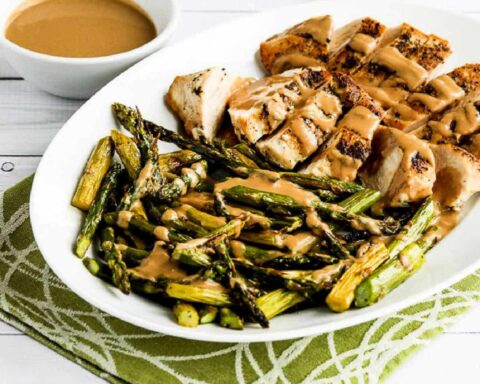Anti-inflammatory foods are those that have been well studied to reduce inflammation in the body. They’re single ingredients that most doctors and nutritionists agree that we need to eat more of them.
If you suffer from an autoimmune disease, diabetes, heart disease, gut disorders or any other inflammatory condition, incorporating more of these simple foods into your diet is a smart idea.
Can changing your eating habits help to improve your overall health? You betcha!

Every time we eat we have the option to choose foods that are inflammatory or anti-inflammatory to the body. Foods that hurt our overall wellness or boost our overall wellness.
Inflammatory foods are sugar, refined carbohydrates, industrial seed oils, alcohol, red meat and processed food (soda, burgers, chips, etc), to name a few.
Anti-inflammatory foods are single ingredients that are unprocessed and unadulterated in any way. They’re the very best from mother nature and well studied for their nutritional value and positive impact on the immune system, cardiovascular system and our bodies and brains in general.
I became well versed in wholesome, anti-inflammatory foods several years ago when I embraced a whole foods diet. After being diagnosed with four autoimmune diseases in two years I realized my body was fighting a mini immune system war and I needed to provide reinforcements. Those reinforcement came in the form of groceries.
The simple concept of getting back in the kitchen and cooking my meals versus grabbing convenient and packaged foods made an enormous difference in my body. Not surprisingly, my immune system rebounded (it’s quite resilient you know).
Anti-Inflammatory Foods Video
Watch the video below as I walk you through my favorite anti-inflammatory foods!
The Best Anti-Inflammatory Diet
The Mediterranean Diet is frequently touted as a top anti-inflammatory diet. Why? Because it’s centered around fresh vegetables, fruits, nuts, seeds and seafood. All whole food ingredients that are packed with nutrients, antioxidants, minerals and essential fatty acids.
But if you’re allergic to nightshades, shellfish or gluten, many recipes in the Mediterranean Diet would actually be inflammatory rather than anti-inflammatory for your body.
That’s why individualized diets are key. At the end of the day, you have to eat in a way that’s nourishing for your unique body. Start with healthy whole foods, then adapt as needed.
8 Anti-Inflammatory Foods I Eat Weekly
Over the years I’ve learned to eat the foods that make me feel my best and which are well-studied to reduce inflammation in the body. But there are 8 key anti-inflammatory foods I find myself eating every single week. Let’s dive in and I’ll tell you why – and give you several recipe ideas for each.
Berries
Berries, whether they’re blueberries, strawberries, raspberries or blackberries all contain antioxidants known as anthocyanins. In fact, it’s the presence of anthocyanins that give berries their vibrant red, blue and purple color.
While all fruits are generally high in antioxidants, berries are superstars with chemical compounds that great at fighting inflammation, cancer and cardiovascular disease. But here’s the cool part. Not only do berries reduce existing inflammation, but they train our cells to respond better to any episodes of future inflammation. And that’s why it’s important to eat them regularly.
Berry Recipes to Enjoy
Leafy Greens
I’m sure you know leafy greens are good for you, but do you know why? Spinach, kale, Swiss chard, arugula, dandelion greens and other leafy greens are rich in antioxidants and alkalizing to the body. They’re packed with vitamins and nutrients including folate, fiber, vitamins A, vitamin C, vitamin E and vitamin K along with a variety of minerals.
While some jokingly refer to leafy greens as “rabbit food,” there’s a reason why most in the animal kingdom prioritize greens. They nourish our body at a cellular level, prevent cognitive decline, keep our gut microbial community in tip top shape and reduce overall inflammation.
Leafy Green Recipes to Enjoy
Salmon
Salmon and other fatty fish such as trout, sardines, anchovies and mackerel are high in essential omega-3 fatty acids (EPA and DHA), which have significant anti-inflammatory properties. Why are they essential? Because your body can’t make them. You must get them from your diet.
If you have an autoimmune condition, omega-3’s are even more important because they’ve been proven beneficial with conditions such as lupus, rheumatoid arthritis, type 1 diabetes, ulcerative colitis, psoriasis and multiple sclerosis.
Omega 3’s are also critical for brain health and interestingly enough, those who consume fatty fish regularly are less likely to be depressed or anxious. In short, omega-3’s are one of the most well-studied nutrients and the results time and again show the massive anti-inflammatory effects they have on the body.
Salmon Recipes to Enjoy
Avocado
When most think of avocados they think of healthy fats. And that’s because avocados are loaded with monounsaturated “good” fats – the kind which help to reduce cholesterol and soothe inflammation of the joints. Avocados are also high in vitamin K, vitamin C, vitamin E, manganese, selenium and zinc.
Heathy fats, like those from avocado are needed for energy, blood clotting, brain development, absorbing fat-soluble vitamins and limiting inflammation. The various nutrients in avocados have also proven beneficial in preventing neurodegenerative diseases such as Alzheimer’s and Parkinson’s.
And fun fact about avocados – they have more potassium than bananas. A 3.5 oz serving of avocado has 14% of the recommended daily allowance of potassium while a banana has 10%.
Avocado Recipes to Enjoy
Broccoli
Broccoli and other cruciferous vegetables, like cauliflower and Brussels sprouts are jam-packed with antioxidants, vitamins and phytochemicals. Broccoli is rich in vitamin K, vitamin C, potassium, magnesium and fiber, but it’s the sulforaphane which makes broccoli extra special.
Sulforaphane is one of the most studied compounds in broccoli. It’s shown to have have protective effects against cancer and detoxify harmful chemicals from the environment that would otherwise trigger inflammation in our body.
Broccoli Recipes (and other Cruciferous Recipes) to Enjoy
Garlic
Garlic has been used for centuries for its medicinal properties and studies show that it has both cancer preventative and immune boosting effects. It’s naturally anti-inflammatory, anti-fungal and anti-viral, which is what makes it so popular in reducing symptoms of the common cold.
Of course, fresh garlic adds an enormous amount of flavor to recipes, but the wide-ranging health benefits are where garlic shines. Garlic contains anti-inflammatory chemicals such as quercetin which naturally inhibits histamine and sulfur compounds that stimulate your immune system to fight disease.
If you have arthritis, garlic may be your best friend as it can help fight the pain, inflammation and cartilage damage of arthritis.
Garlic Recipe to Enjoy
Ginger
Ginger, like garlic, has been used for centuries around the world for its healing properties. It’s well known for relieving nausea and helping with motion sickness and pain.
Ginger contains substances known as gingerols that reduce inflammation and turn off pain-causing compounds in the body. In terms of digestion, ginger supports digestion and helps with motility, moving things things more efficiently through our intestines. I’m all for fresh ginger, but when ginger capsules can move things through our intestines twice as fast, that’s pretty amazing!
Because of these digestive benefits ginger has proven to reduce colorectal cancer and boost the immune system (remember that 75-80% of your immune system comes from your gut).
Ginger Recipes to Enjoy
Chia Seeds
Chia seeds may be known as a superfood today, but in ancient times they were a dietary staple for providing energy. The word “chia” actually translates to “strength” in ancient mayan language.
In addition to the numerous vitamins and nutrients in chia seeds, they also provide a hefty dose of fiber (in fact, they’re one of the best sources of fiber in the world). That’s key for balancing blood sugar and good gut health.
Chia seeds, along with flax seeds, are loaded with antioxidants and omega-3’s. The antioxidants fight free radicals and the omega-3’s reduce inflammation (as I mentioned above with the salmon). In a world where our ratio of omega-6 to omega-3 is out of balance, chia seeds are an easy way to keep the balance. And keep our health.
Chia Seed Recipes to Enjoy
Want more anti-inflammatory recipes? Check out my video on anti-inflammatory drinks! With a variety of juices, smoothies, teas, and tonics, it’s easy to boost your wellness.
I hope you enjoyed learning more about these ingredients and the enormously positive impact they can have on the body. I have hundreds more healthy recipes on my website, so make sure to check those out for healthy meal inspiration. And don’t forget that daily healthy habits work hand-in-hand with healthy food for improved wellness.
Description
These easy anti-inflammatory foods help reduce inflammation in the body, supply our bodies with nutrients, and boosts our overall wellness. One of the simplest recipes is this steamed broccoli!
-
Bring one inch of water to a boil in your pot.
-
While you’re waiting for your water to boil, use a knife to cut the head of broccoli into florets.
-
Add your steamer basket to the pot and place the broccoli florets on the steamer. Reduce the heat to medium, add lid and steam for 5-6 minutes, for tender crisp broccoli.
- This is a great steamer basket and it’s adaptable to many different size pots. I also love the easy to grab handle.
Calories: 103kcal | Carbohydrates: 20g | Protein: 8g | Fat: 1g | Sodium: 100mg | Potassium: 960mg | Fiber: 7g | Sugar: 5g | Vitamin A: 1895IU | Vitamin C: 271.2mg | Calcium: 143mg | Iron: 2.2mg
©Downshiftology. Content and photographs are copyright protected. Sharing of this recipe is both encouraged and appreciated. Copying and/or pasting full recipes to any social media is strictly prohibited.
Originally posted April 2019, but updated with new information.













